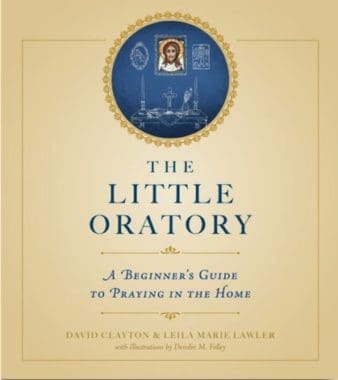I always say to beware of those “The One Thing You Need To Know” about most things, but particularly when it comes to Christianity. A religion of paradoxes (three Persons in one God, the last shall be first, lose your life to find it, and so on) can hardly be amenable to tidy meme-ification.
And yet… the liturgical year is perhaps not that One Thing, but it is All The Things. Cleaving to it in the home, in union with its celebration in the universal Church, is the way to keep your peace. I’m thinking particularly, as we approach the new school year, of the anxiety that can arise when conscientious mothers observe the many ideas displayed on social media by highly organized, incredibly motivated homeschoolers. I’m sure all these organized people are wonderful — and certainly when we need inspiration (which is a good deal of the time), they are appreciated. I for one am happy for the visuals.
However, it is well to remember that any one person can only do some of the things some of the time, and my mission is to say that knowing what’s for dinner, getting some laundry done, and tidying up might not make for a fancy IG feed, but it will help you not lose your mind.
Over the years, on my blog, Like Mother, Like Daughter, I have tried to offer my thoughts on these remote preparations for successful homeschooling. I have a plethora of posts there, and a forthcoming three-volume set of books on what we call “the collective memory,” called The Summa Domestica: Order and Wonder in the Home.
The truth is that once you start on the road to order, you quickly realize that homemaking itself relies on the liturgical year: the real key to everything. “The liturgical year is… Christ Himself,” says Pope Pius XII in his encyclical Mediator Dei:
165. Hence, the liturgical year, devotedly fostered and accompanied by the Church, is not a cold and lifeless representation of the events of the past, or a simple and bare record of a former age. It is rather Christ Himself who is ever living in His Church.
Moving through the year in tune with the Church offers us a sacred rhythm that becomes the most fruitful path to encounter God and His will for us. Right now, when minds turn to the coming school year and fretfulness (as well as excitement) can run high, remembering that there is this given path brings calm and peace. Among other things, following the liturgical year will, in an organic way, assist us to prioritize and evaluate our goals in our vocation to educate our children.
Even the secular calendar makes more sense when seen in the light of the sacred one. To take a small example that charmingly ratifies my intuition, every November I am surprised and delighted to be reminded that the feast of St. Martin coincides with Veterans Day, as well as what used to be called Armistice Day and Remembrance Day. And this is no coincidence because traditionally peace treaties were sought and signed on his feast, and the Armistice ending World War I was deliberately scheduled for the eleventh hour of the eleventh day of the eleventh month. Of course, St. Martin of Tours was a soldier who followed Christ, and the patron, as a veteran, of soldiers.
Anyway, my point is that if you put some (understandably limited) energy towards making the liturgical year your pattern, you will experience flourishing in your home and your school. I can promise it!

I do have a book that explains, written with David Clayton. Basically, it’s the book I wished I had had when I was starting out, so I am overcoming my reluctance to self-promote in order to make sure that you know about it. The Little Oratory: A Beginner’s Guide to Praying in the Home is unlike other books on prayer you may be familiar with. It is not a big hodge-podge of devotions and more activities to put on the family’s plate that may or may not relate to their situation and inclinations. Rather, we try to convey the idea of how the liturgy itself simplifies and unites us in ancient, continuous, and universal prayer, elegantly overcoming the syndrome of ever-multiplying oughts and musts.
Liturgical time is made up of all the units — moments, hours, days, weeks, seasons, years, even decades and millennia (think of Jubilee centenaries!). Sanctifying those units by the traditional means of prayer (primarily with the Psalms in their God-given order), understanding the ancient wisdom that shows us how they bring us to Christ, helps the confused and whiplashed family on their way to a more calm existence.
For those desperately searching for Order and Wonder, putting some effort put into making a prayer place in the home will lead to less effort overall in the coming school time. Living the liturgical year, observing it in the home, praying as a family united to the Church — this is the organizing principle of life in Christ.
Editor’s note: This post is a modified version of a post on Like Mother, Like Daughter and is reprinted here with permission of the author.
Featured image courtesy of Pixabay.




